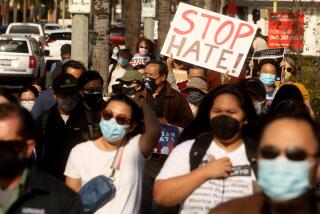Plan to Release “Chan” Videos Irks Asian-Americans
- Share via
“Key Video Celebrates the Chinese New Year in February with the Release of Seven Charlie Chan Mysteries.” That’s how the press release read. But is celebrates really the right word?
Some leaders of Los Angeles’ Chinese-American community don’t think so. They’re considering a protest against the release of the seven videocassettes on Thursday (actually three days after the Chinese New Year), though no definite plans have been made yet.
Three Asian-American community leaders contacted by The Times said that “something” will be done--perhaps picketing--if the films, which include “Charlie Chan at the Opera” (1936) and “Charlie Chan’s Secret” (1935), are released.
However, another frequent spokesperson for the L.A. Asian community, KTLA-TV staff producer Sumi Haru, said it might be better to do nothing about the videotape release. Protests may only make more people seek out the films, she noted, adding that a letter to the news media might be a better idea.
In any case, Haru said she does not believe there will be any action like that which greeted Michael Cimino’s controversial film “Year of the Dragon” in 1985. Asian-Americans picketed that movie in several cities to protest its depiction of life in New York City’s Chinatown and succeeded in getting MGM/UA to add a disclaimer to the film.
The chief objection to the “Charlie Chan” series is the portrayal of a Chinese detective by Caucasians (primarily Warner Oland and Sidney Toler).
“It would be like having a black man portrayed by a white man in blackface,” said one local activist, who asserted that “Charlie Chan” movies demean and distress Chinese-Americans as much as “Amos and Andy” and Stepin Fetchit films do black Americans.
Other objections include the “stereotypical” characters and speech.
George Krieger, president of CBS/Fox, Key Video’s parent company, said in a prepared statement that, “The Charlie Chan films are classic, immensely popular films which reflect the culture and the mores of society in the 1930s and 1940s, when the pictures were produced. If you watch the films, you will find that their entertainment value endures and Mr. Chan always emerges as a hero.”
Both the video company and its public relations firm said that they were “unaware there was any problem” with releasing Charlie Chan films, or that there was any objection to them in the Chinese-American community.
In his “TV Movies and Video Guide,” B-movie expert Leonard Maltin notes that the series, based on books by Earl Derr Biggers, began in 1926 and became most popular after Oland assumed the role in 1931. The cheaply made films portray a stoic, witty sleuth always at odds with his “Number One” and “Number Two” sons (played by Keye Luke and Sen Yung). After Oland died in 1937, Toler took over the part. A third actor, Roland Winters, also starred in a few unnotable entries.
More to Read
The biggest entertainment stories
Get our big stories about Hollywood, film, television, music, arts, culture and more right in your inbox as soon as they publish.
You may occasionally receive promotional content from the Los Angeles Times.










